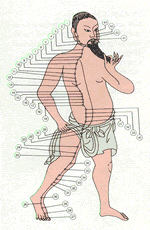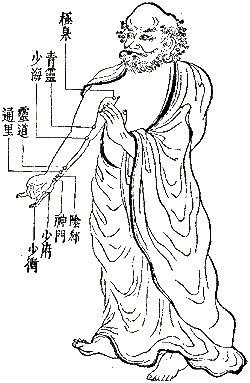CHINESE MEDICAL CENTRE

Chinese Medical Massage,Acupuncture
Moxibustion, Bonesetter Oesteopath and Chinese Herbalist
CHINESE MEDICAL CENTRE
Chinese Medical Massage,Acupuncture
|
Wei Hou |
Fei Yang
Zhang |
|
NZ registered Acupuncturist |
Chinese medical doctor (China) |
|
| ACC Registered | ||
| 172 Gossamer drive Pakuranga | ph 09 576 9838 | |
| Auckland New Zealand | a/h 025 662 3320 |
|
What Can Acupuncture Treat?
The answer is simple; Most everything.
Most conditions can be treated by acupuncture, herbs, or a combination of the five therapeutic modalities of Chinese medicine: acupuncture, herbs, massage (Tuina), diet therapy, and moving meditation (Qi Gong, Tai Chi). When I make such a broad claim people often look startled and then start throwing names of conditions at me: Hemorrhoids? Arrhythmia? Colds & flu? Hypothyroidism? Diabetes? Slipped discs? Headaches? Asthma? Fallen arches? Ulcers? High blood pressure? Diarrhea? Osteoporosis? PMS? Depression? Rashes? Infertility? The answer is still “Yes” but readers should remember that Chinese medicine views the body differently from our familiar biomedicine, so these conditions are seen not so much as “diseases” but as perturbations in the flow of bodily energies. The practitioner’s task is to identify the kind of perturbation and its cause, and then to correct it.
For example, hemorrhoids (and varicose veins) indicate blood stasis, that is, the blood is pooling instead of moving on. The practitioner tries to understand why it pools, tries to remove the deeper energetic cause, and then the superficial symptom should correct itself. This model applies to all Chinese medicine: Find the energetic imbalance, and correct it. The energetic imbalance is inside you – thus care is individualized, and the goal is to strengthen you in such a way as to ensure your energy flows as smoothly as possible.
Here is another example: Sometimes a person comes with a series of conditions
for which, as often as not, they’ve seen a series of specialists.
Dry eyes take them to the ophthalmologist, constipation to the internist,
and low back pain with achy knees to the rheumatologist. The acupuncturist
listens to the whole list, asks questions, checks the pulse, reflex points,
and the tongue, looking for the energetic clues that link these complaints
together. A careful choice of acupoints, an individualized herbal combination,
and within a short time the patient finds relief of all their symptoms,
including some they may not have even mentioned. In short, the acupuncturist
doesn’t see the complaints as separate disorders, but as signs of
the same underlying imbalance. That is why the simple intervention with
needles, and possibly herbs or other helps, can adjust all the complaints
at once. Acupuncture and herbal care are not expensive and often pay huge
dividends in improved health and wellbeing!
Treatment
On your initial visit I will gather information on your symptoms and treatment to date; your medical and family history; your systems or functions (e.g. sleep,appetite, digestion, etc.); and your physical condition, e.g. distribution of body heat and condition of the skin. The purpose of this is to arrive at a diagnosis in Traditional Chinese Medicine. A treatment follows this history taking, and the whole first consultation can take up to 90 minutes. Subsequent treatments usually last around 60 minutes. Generally patients visit weekly to begin with, possibly more frequently if your condition is acute. As you improve, you will visit less frequently. The speed of improvement varies more according to the person than the label of the complaint. Does it hurt? "A doctor who prescribes an identical treatment for an identical
illness in two individuals and expects an identical development may be
properly classified as a social menace." |

Wei Hou |
Fei Yang
Zhang |
|
NZ registered Acupuncturist |
Chinese medical doctor (China) |
|
| ACC Registered | ||
| 172 Gossamer drive Pakuranga | ph 09 576 9838 | |
| Auckland New Zealand | a/h 025 662 3320 |